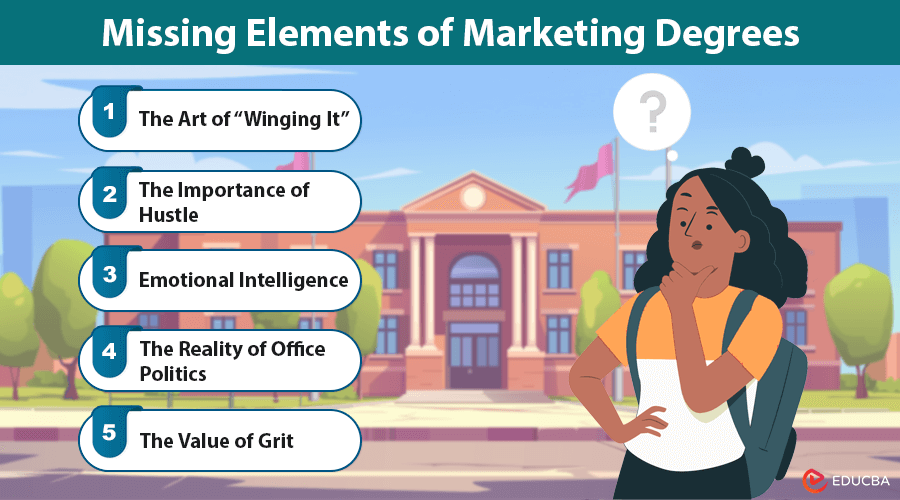
Missing Elements of Marketing Degrees
Transitioning from a university to a digital marketing agency can be surprising. You quickly realize that life in the real world is nothing like your structured marketing degree. Here is the truth: Marketing degrees provide a solid foundation, but critical gaps leave graduates unprepared for the dynamic, fast-paced nature of modern marketing. In this article, we will look at the missing elements of marketing degrees.
The Contrast Between College and Real-World Marketing
In college, structure rules. Deadlines, assignments, and exams provide predictability. The real world? It is chaos. Unexpected client demands, last-minute changes, and ever-evolving market trends define your daily life. Does this mean you should skip a marketing degree? Absolutely not. However, you must balance your academic foundation with real-world adaptability to succeed.
What are the Missing Elements of Marketing Degrees?
#1. The Art of “Winging It”
College life operates on a fixed schedule. In professional marketing, last-minute crises and shifting priorities are the norm. Knowing how to think on your feet and adapt quickly is essential.
Being flexible does not mean being unprepared. It means staying resourceful and calm under pressure.
#2. The Importance of Hustle
You might have learned about strategic planning and data analysis in your degree, but hustle is not in the curriculum. Success often depends on your willingness to go the extra mile.
- Spend extra time perfecting campaigns.
- Attend industry events and network.
- Continuously learn and evolve—marketing is a never-ending hustle.
#3. Emotional Intelligence
Marketing is people-centric. While your degree might have touched on consumer behavior, emotional intelligence is key to navigating relationships with clients, colleagues, and stakeholders.
Emotional intelligence involves:
- Building strong connections.
- Handling criticism constructively.
- Communicating ideas clearly and actively listening.
#4. The Reality of Office Politics
In university, you choose your friends. In the workplace, your team assigns you. Learning to work with diverse personalities, navigating team dynamics, and maintaining professionalism is critical.
To succeed:
- Build relationships with mentors and industry leaders.
- Focus on collaboration and integrity.
#5. The Value of Grit
Marketing is tough. Rejections, setbacks, and tight deadlines are part of the game. Your degree might teach theory, but grit—perseverance and passion—help you push through challenges.
- Learn from failures.
- Celebrate small victories.
- Set realistic goals to maintain motivation.
#6. Practical Experience Matters
Internships and hands-on experience are often missing elements of marketing degrees. These opportunities provide a glimpse into real-world marketing challenges.
Maximize your summers:
- Pursue internships (paid or unpaid).
- Take on freelance projects or volunteer.
- Learn practical skills like project management.
#7. Navigating Budget Constraints
In college projects, budgets are hypothetical. In reality, marketers work with tight budgets and limited resources.
To thrive:
- Learn to prioritize spending.
- Find creative ways to achieve results within constraints.
#8. Digital Marketing Is Constantly Changing
Marketing degrees often focus on foundational concepts, but the digital landscape evolves daily. Platforms like MySpace are gone, while trends like short-form video dominate today.
Stay updated:
- Follow industry experts on LinkedIn.
- Read blogs and attend webinars.
- Adapt quickly to new tools and trends.
#9. Data-Driven Decision-Making
Your degree might teach data analysis, but data must be combined with creativity and intuition to make impactful decisions in the real world.
- Transform raw data into compelling stories.
- Understand data biases and limitations.
#10. The Competitive Job Market
Marketing degrees do not guarantee jobs. With over 405,000 marketing specialists in the U.S., competition is fierce.
Stand out by:
- Building a strong network on LinkedIn.
- Attending industry events.
- Being patient and persistent in your job search.
The Unexpected Rewards of Marketing
Despite the challenges, marketing offers immense rewards. It is a creative field where you can see the direct impact of your work. Campaigns like Dove’s 2004 “Real Beauty” initiative show how marketing can create positive change and leave a lasting impact.
Final Thoughts
A marketing degree is a great foundation, but success lies in bridging the gap between theory and practice. Consider taking professional assistance from reliable academic writing services. Focus on building practical skills, gaining real-world experience, and staying adaptable to thrive in the ever-changing marketing landscape.
Frequently Asked Questions (FAQs)
Q1. Can you be successful with a marketing degree?
Answer: Yes, marketing degrees provide foundational knowledge, opening doors to careers like digital marketing, market research, and more.
Q2. Can you succeed in marketing without a degree?
Answer: Success is possible with the right skills and experience. However, a framed degree adds credibility and opens up more opportunities.
Q3. Is marketing a good major for introverts?
Answer: Yes! Marketing has roles for everyone, from client-facing positions to analytical jobs like SEO or data analysis.
Recommended Articles
We hope this article shed light on the missing elements of marketing degrees. Explore these recommended articles for deeper insights into building a successful marketing career, enhancing practical skills, and staying ahead in the competitive industry.
